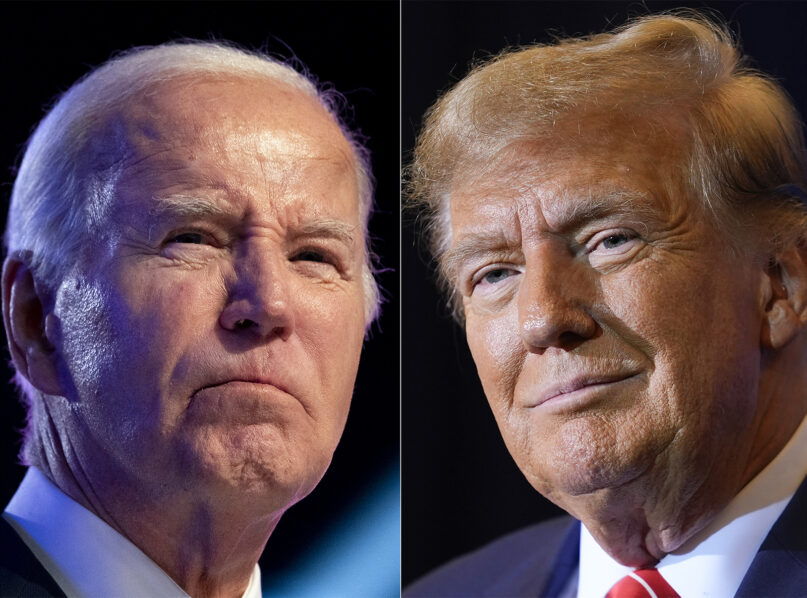(RNS) — Making her endorsement of Nikki Haley for president last week, “Judge Judy” Sheindlin pointed to Haley’s youth compared to Joe Biden and Donald Trump. The former is 81; the latter, 77.
The reality show judge confessed that, at 81 herself, she “need(s) a nap in the afternoon,” and “so does Joe Biden. Probably two.”
Then again, the media personality and philanthropist, whom a Reader’s Digest poll once found was more trusted by Americans than any member of the Supreme Court, also confesses to running a successful business and being “the matriarch of a family of 20,” of “work(ing) out every day and hav(ing) an active social life.”
True, Biden’s stumbles — on Saturday in South Carolina he called Trump “the sitting president” — are nearly constant, while Trump, whose campaign speeches seem to consist largely of runaway trains of thought, recently confused Haley with Nancy Pelosi and warned that Biden could “plunge the world into World War II.”
But both men have made disconcerting gaffes for years, well before advanced age could be blamed. All people make embarrassing mistakes; the ones made by people in the public eye simply don’t escape attention (and looping on cable news).
While aging can indeed take a toll on stamina (necessitating those naps, which I personally attest to employing on occasion, though I’m younger than the presidential frontrunners), there’s something that all the fretting seems to miss: The value of age. The yield of having lived more years, witnessed more things and undergone more experiences than younger folks.
Judaism, for its part, considers the judgment of an older person (“zakein,” in Hebrew), at least when age hasn’t clearly compromised cognition, to be superior to that of younger ones. In Hebrew, the letters of “zakein,” contends the Talmud, suggest a sort of pun implying, “Here is one who has acquired wisdom.”
Commenting on the 10th-century BCE Judean King Rehoboam’s decision to shun the advice of the court elders who counseled his father, King Solomon (on a domestic tax issue, as it happened), and heed instead that of younger advisers, the Talmud remarks that “what may seem a constructive approach among the young” can in fact be inferior to “what may seem a destructive approach of older people.”
Rehoboam’s reliance on his more “with it” advisers brought schism to the Jewish kingdom, fanning the flames of rebellion.
It’s not just cheese and wine that can improve with age. Many are the highly accomplished whose achievements stretched well into their senior years.
At the end of Ronald Reagan’s two terms, he was 77 years old. Although years later he developed Alzheimers, he showed no impairment to his judgment during his presidency.
Supreme Court Justices John Paul Stevens and Oliver Wendell Holmes both retired at 90.
Pelosi, twice speaker of the House and currently serving her 19th term in Congress, is 83. U.S. Rep. Grace Napolitano is 87. Representative Maxine Waters is 85.
And then there are the cultural icons who have been active in their golden years. Bob Newhart won an Emmy in 2013 for a performance at age 84. Dick Van Dyke made a triumphant return to acting in 2018 at age 92. At 97, Mel Brooks is as funny as ever. Paul Simon and Bob Dylan are both 82 and still actively producing music (and Dylan, touring).
There are those who don’t even start their defining careers until they are seniors. Grandma Moses, the celebrated American folk artist who graced the cover of Time in 1953, began painting at 78. Fast foodies might want to ponder that Colonel Harland Sanders established the Kentucky Fried Chicken chain at age 65 and sold his share in 600 franchises nine years later.
But the most pertinent statistics may pertain to how young many are in old age today. The average life expectancy in the United States rose from 68.2 in 1950 to 77.8 in 2020, and are retaining their wits longer, according to a 2017 study published in JAMA Internal Medicine, which found that prevalence of dementia among the elderly declined significantly in just the dozen years between 2000 and 2012.
While we should keep an eye on both candidates’ apparent mental fitness, their numerical age is not in itself a criterion. “Age,” Dr. Nir Barzilai, who directs the Institute for Aging Research at the Albert Einstein College of Medicine, told The New York Times in 2022, “is not something to consider on its own.”
Appreciation of the upside of older age, whether borne out of Jewish tradition or modern science, goes against contemporary society’s worship of youth, evident in the more than $500 billion that is spent globally on beauty products and procedures each year, much of which are designed to help people pretend to be younger than they are.
To my lights, it’s that expenditure, not older people’s occasional stumblings on words or steps, that implies poor judgment.
Voters will likely have to decide which of two elderly men they favor for president. Despite the tweeters (Xers?) and pundits disfavoring either candidate, neither man, to an objective observer, seems truly cognitively impaired. And so, what should count are the men’s character, priorities, wisdom and abilities. Not their ages.
(Rabbi Avi Shafran writes widely in Jewish and general media and blogs at rabbishafran.com. He also serves as director of public affairs for Agudath Israel of America, a national Orthodox Jewish organization. The views expressed in this commentary do not necessarily reflect those of Religion News Service.)





